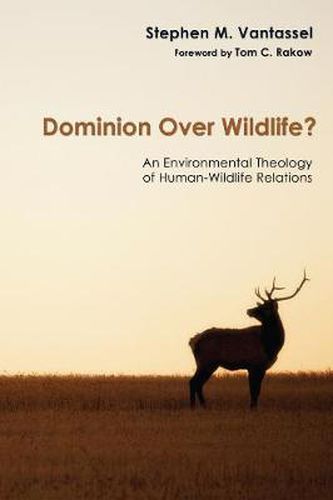Readings Newsletter
Become a Readings Member to make your shopping experience even easier.
Sign in or sign up for free!
You’re not far away from qualifying for FREE standard shipping within Australia
You’ve qualified for FREE standard shipping within Australia
The cart is loading…






This title is printed to order. This book may have been self-published. If so, we cannot guarantee the quality of the content. In the main most books will have gone through the editing process however some may not. We therefore suggest that you be aware of this before ordering this book. If in doubt check either the author or publisher’s details as we are unable to accept any returns unless they are faulty. Please contact us if you have any questions.
For centuries Christians believed that God granted humanity dominion over the animal kingdom, meaning that we had a moral right to kill, manage, and eat animals including wildlife. Recently, however, environmental and animal rights activists have assaulted this traditional perspective. They argue that dominion as expressed in meat eating and hunting has resulted in species extinction and environmental degradation. Christian Animal Rights (CAR) activists suggest that the church must reevaluate its traditional beliefs in light of the fact that God’s original creation was free of human on animal violence. God, they argue, did not want man’s dominion to be expressed through trapping, killing, and eating of animals. These violent activities only came about after the Fall, as God condescended to our hardness of heart. CAR activists point to Christ’s sacrificial work of reconciliation as a model for modern Christian behavior: as Christ sacrificed for us, we should avoid eating meat and hunting as ways we can participate in Christ’s non-violent work of reconciling creation to himself. In this book, Stephen Vantassel investigates the biblical, ethical, and scientific arguments employed by the CAR movement concerning human-wildlife relations. In this regard, the book engages in practical theology by addressing several important questions: How should Christians treat our wildlife neighbors? Has the Church been wrong in its understanding of human dominion? Does God want Christians to avoid hunting, trapping, fishing, and adopt a vegetarian lifestyle? This book provides answers to these questions by detailing a theology the author calls, Shepherdism.
$9.00 standard shipping within Australia
FREE standard shipping within Australia for orders over $100.00
Express & International shipping calculated at checkout
This title is printed to order. This book may have been self-published. If so, we cannot guarantee the quality of the content. In the main most books will have gone through the editing process however some may not. We therefore suggest that you be aware of this before ordering this book. If in doubt check either the author or publisher’s details as we are unable to accept any returns unless they are faulty. Please contact us if you have any questions.
For centuries Christians believed that God granted humanity dominion over the animal kingdom, meaning that we had a moral right to kill, manage, and eat animals including wildlife. Recently, however, environmental and animal rights activists have assaulted this traditional perspective. They argue that dominion as expressed in meat eating and hunting has resulted in species extinction and environmental degradation. Christian Animal Rights (CAR) activists suggest that the church must reevaluate its traditional beliefs in light of the fact that God’s original creation was free of human on animal violence. God, they argue, did not want man’s dominion to be expressed through trapping, killing, and eating of animals. These violent activities only came about after the Fall, as God condescended to our hardness of heart. CAR activists point to Christ’s sacrificial work of reconciliation as a model for modern Christian behavior: as Christ sacrificed for us, we should avoid eating meat and hunting as ways we can participate in Christ’s non-violent work of reconciling creation to himself. In this book, Stephen Vantassel investigates the biblical, ethical, and scientific arguments employed by the CAR movement concerning human-wildlife relations. In this regard, the book engages in practical theology by addressing several important questions: How should Christians treat our wildlife neighbors? Has the Church been wrong in its understanding of human dominion? Does God want Christians to avoid hunting, trapping, fishing, and adopt a vegetarian lifestyle? This book provides answers to these questions by detailing a theology the author calls, Shepherdism.